Articles by Adam Zaki
Adam is a Reporter from Long Island and graduate of Brooklyn College.
Five ‘NFT Like’ Things You May Already Own
December 9, 2021 Do you own an NFT? Believe it or not, you probably already own something very similar. Value being predicated on tangibility is a thing of the past. Below are five things you probably own or want to own that are similar to NFTs.
Do you own an NFT? Believe it or not, you probably already own something very similar. Value being predicated on tangibility is a thing of the past. Below are five things you probably own or want to own that are similar to NFTs.
1. Followers on Social Media
Are you tracking the number of people looking at your Instagram stories? Trying to either get more followers or expand your online presence? These things are online assets that are intangible, only have value in the eyes of the beholder, and cannot be exchanged for an equal asset.
2. Twitter Verification
Do you have or desire to have a blue checkmark on Twitter? This is one of the most valuable assets of the internet, and can validate your online presence. With value only given and backed by those in the community, the blue check mark is the NFT of Twitter.
3. Video Game Products
Games like Call of Duty, Fortnite, and the 2K series offer all types of digital purchases that can enhance the game experience, so much so that those that spend real money on virtual items can have a competitive advantage. These can be bought with real cash, earned through gameplay, or traded for other in-game assets. If you have the best cards or coolest clothing on your virtual character, that earns players big time legitimacy in the gaming world.
4. Area Codes
In major cities like New York, area codes have a prestigious nature about them. Don’t be caught with a 845 or 201 area code if you’re trying to look like a legitimate New Yorker.
5. iMessages
Much like digital art, some pieces are much more prestigious than others. Just like if I ask you if you’re iPhone or Android, I could ask you if you’re a Bored Ape or Cryptopunk. The blue messages that come with iMessaging are a big builder of iPhone’s value, and perception of its users, just like the value of the brands certain types of NFTs stem from. If your texts are green on IOS, many iPhone users will think differently of you. This same concept applies to the NFT sects.
The Industry is Back; Broker Fair Takes NYC
December 7, 2021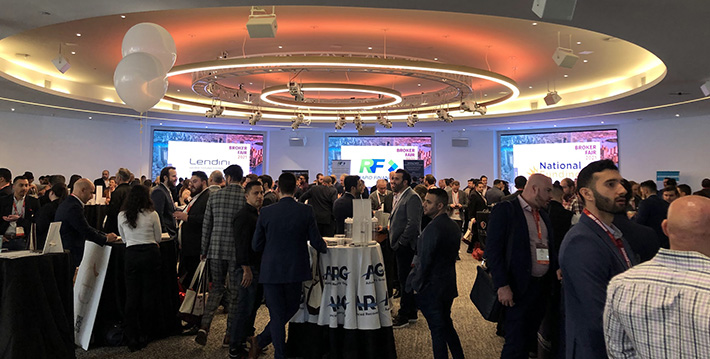 Broker Fair 2021’s showcasing in lower Manhattan on Monday brought together an unprecedented amount of attendees, that not too long ago saw their entire livelihoods and industry threatened by a pandemic-hampered economy.
Broker Fair 2021’s showcasing in lower Manhattan on Monday brought together an unprecedented amount of attendees, that not too long ago saw their entire livelihoods and industry threatened by a pandemic-hampered economy.
“We are so happy to be here,” said Sonia Alvelo, CEO of Latin Financial and speaker on the ‘Great Debate’ panel. “With everything that has happened in the past two years, we are just super excited to be a part of this.”
Speakers at the event included keynote Slava Rubin, founder of Indiegogo, Oz Konar of Business Lending Blueprint, and Leo Kanell of 7 Figures Funding.
“We’re here to rekindle,” said Adam Abraham, Partner at Blueline Capital Group. “It’s always good to meet face to face. We’ve all been speaking on the phone for years at this point, so if you put a face to the name, it changes everything.”
That alone, is the best part about this event,” said Abraham. “Here, it’s about who you’re networking with.”
Other attendees felt that alongside the networking opportunities, events like Broker Fair allow the industry to truly leverage its core strength — its relatively small size compared to other areas of the financial world.
“Despite what many people think, this industry isn’t really as big as other finance industries,” said Josh Feinberg, CEO of Everlasting Capital. “When we come together like this, it really drives inspiration, thoughts, and dreams to be able to make this industry what it is today. I think these events really bring everyone together to drive the industry to the next level.”
A total of five panels took the stage throughout the day, and included individuals from across the business financing landscape. Other highlights of the event included a Small Business Finance Professional certification course, an expo room with over fifty companies and tables, and a hip-hop performance with viral artist Kosha Dillz.
At the event, deBanked Connect Miami was announced, which will take place on March 24. For the first time, deBanked will shift away from Miami Beach and into Downtown Miami, an area in which many members of the finance, crypto, lending, and banking industries have resettled and developed new flagship offices.
“I’m super pumped about the announcement of the show,” said Feinberg. “We’ll see everyone in Miami.”
Q&A with Rachel Sanders on how Small Businesses Can Utilize Blockchain Tech
December 3, 2021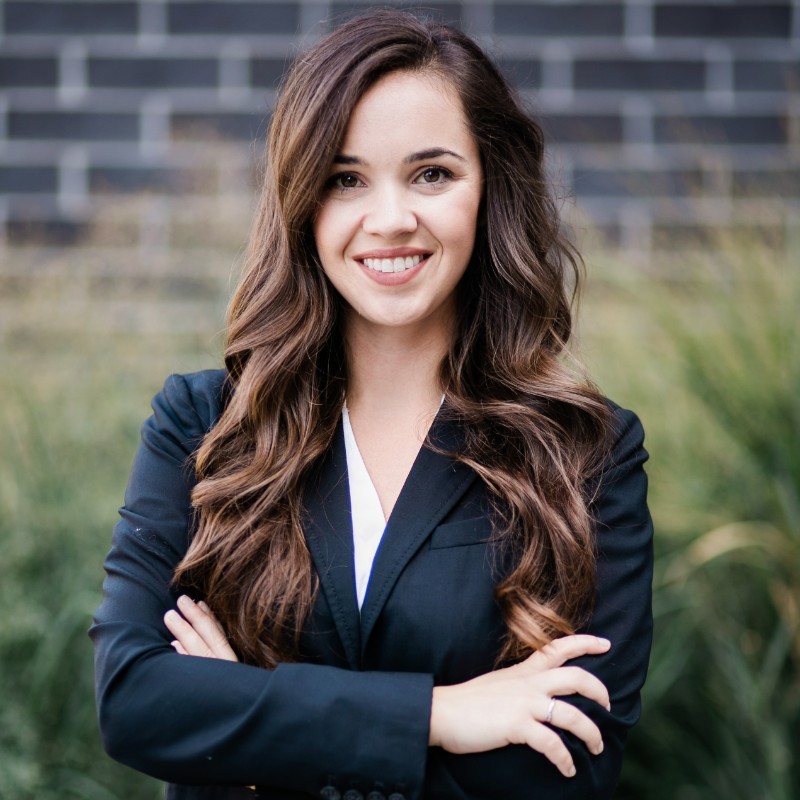 At the NFT BZL conference in Miami on Tuesday, deBanked bumped into Rootine, a vitamin company that is looking to expand into the crypto space. Rootine is a small business that exists fully in the tangible world and sells a tangible product. They offer a completely customized vitamin concoction to their customers via questionnaires that identify biomarkers on their online platform.
At the NFT BZL conference in Miami on Tuesday, deBanked bumped into Rootine, a vitamin company that is looking to expand into the crypto space. Rootine is a small business that exists fully in the tangible world and sells a tangible product. They offer a completely customized vitamin concoction to their customers via questionnaires that identify biomarkers on their online platform.
This all begs the question, how do small businesses like Rootine leverage crypto? Rachel Sanders, CEO and co-founder of Rootine, shared her thoughts.
Q (Adam Zaki)- Your product is obviously inspired by tech and customer experience. Why are these fundamentals of Rootine?
A (Rachel Sanders)- We are in the middle of a health data revolution. More consumers than ever before have access to critical data about their health and this access will only grow. People should be able to leverage their data to optimize their health with precision health products and actionable insights tailored to their unique data and goals. Technology is the key to make this possible.
At Rootine, our mission is to empower members to leverage their data to achieve optimal health and fuel their potential. Rootine analyzes your body to deliver a precision daily multivitamin engineered to optimize your health, and then fine-tunes your formula over time to continuously provide optimal support for your body. Our team has worked hard to build with a human-first mentality, creating a brand that both delights our members and makes a real, and positive impact on their health. We are proud to empower thousands of members to improve their health and are excited to make an even bigger impact in 2022!”
Q-What was Rootine doing at an NFT conference?
A- As the world of web3 and NFTs ballooned in the second half of 2021, we saw a community emerging celebrating vices and fueled by alcohol. There was also this odd dichotomy occurring where health influencers were changing their profile pictures to NFTs depicting un-healthy vices. We believed that heath should be a central part of the conversation in web3, so we dove in.
Rather than build a branded NFT project, we spearheaded a collaborative effort to launch Apex Optimizers, the first NFT project exclusively focused on health and human performance optimization. Community members represent brands like Eight Sleep, Rootine, Hydrant, Span Health, Bioloop, Aloha, Gwella, OneSkin, and Bristle. Early team members from Levels and founders at Bristle, health experts like Louisa Nicole and Dr. Sohaib Imitaz, professional athletes like Justin Gatlin, as well as a number of high performers and crypto and NFT heavy hitters like Steve Aoki.
It has been difficult working in unchartered territory (as a project like this has never been done before), but we were driven by a mission to build an inclusive community highlighting the importance of data-driven health and to deliver tangible real life utility to holders. We have been fortunate to collaborate with some of the top health experts, brands, athletes, and founders in human performance while building a community that is already inspiring its members to improve in areas like sleep, stress, nutrition, fitness, mental health and more.
Q-How will NFTs enhance your product? Why do you think your customers would be more willing to buy products that have some type of blockchain component?
A– As we think about the future of the metaverse, consumer products and brands will play a large role. Exactly what that role looks like is yet to be determined. What we do know is that health will continue to matter and that consumer health brands will need to have a strategy around how they will tie their physical products and experiences into the digital world. As for Rootine, creating a trusted brand and impactful community is always top of mind. To do that, we want to be where our members are and offer unique opportunities that members will not find elsewhere.
One example of that is helping to launch Apex Optimizers. Apex Optimizers is just one of the offerings of the Precision Health Club and it is first and foremost an awesome community of like-minded data-driven health enthusiasts looking to improve how they look, feel, and perform everyday. Gaining access to that community is something Rootine can offer that others cannot, and that is valuable. Through Apex Optimizers we are also able to offer loyal Rootine members access to exclusive perks like 1:1 lessons with pro-athletes, multi-brand discounts and product drops, and real-life wellness experiences.
Q-What are you thoughts on access to capital for small businesses? Has Rootine ever found it difficult to get a loan? Do you think crypto could help the imbalance of access to funds for small businesses?
A- Access to VC capital is a challenge for many. In the VC world, only 2.2% of funding goes to female founded companies, and other minorities and underrepresented founders have similar difficulty. For others, the capital markets have been very founder-friendly recently, with companies raising VC funding at unprecedented valuations.
In the non-VC world, there are a number of new options coming to market that make it easier to get non-dilutive funding. Pipe and Clearco are two great examples. However, to get access to that funding, you have to meet specific size and business model criteria.
Crypto certainly has the ability to put more fundraising power into the hands of creators and builders. There will be more companies using crypto as a way to raise seed capital, and we are already seeing this trend. One thing to note here, is that as the barrier to enter web3 drops, there is going to be more competition for dollars, which will raise the bar on the projects and teams that will succeed in getting funding this way.
Q-Is crypto a topic of conversation in the office? I’m trying to gauge whether your staff has an interest in crypto or if this is just a pure marketing strategy.
A- We have a combination of people very into crypto (e.g. our lead product designer who was an early advocate and continues to be a key thought leader on the team) as well as crypto novices.
It has been exciting to see how the conversations on slack have created an environment of learning and support, helping more people get into the space in a way they are comfortable with. Apex Optimizers’ mission is to make an impact at scale through community, democratizing access to innovation, and by elevating the message around the importance of data-driven health.
For the brands involved, there is of course a marketing component, but at the core, we all came together to help more people live healthier lives because all brands involved support better health.
Q- The crypto space wants to move into the Metaverse. How will Rootine, a company that sells a physical product- vitamins nonetheless- pivot if the crypto community lives in a world where a desire to be healthy may decrease? (If I live in the digital world, with digital art, digital money, digital games, a remote job, and digital friends, why would I want to buy vitamins?)
A- Even if the majority of your life is spent in the digital world, you will still want to feel and perform your best on a daily basis. If people start to neglect health, their productivity decreases, their ability to be their best self at-home with their families and partners decreases, and their stress levels, fatigue and risk for chronic conditions increases. Rootine offers a convenient, at-home way to test your body and get precision multivitamins that can support better overall health, stress levels, energy, focus and more, fueling your potential.
Another interesting thing to note, is if you look at the people building the meta world, a vast majority are the same people who love to compete in athletic feats, biohack their bodies to optimize their productivity, or focus on specific diets. Because of this, health will always be a part of digital communities.
Q- What is the strategy here? Why mint an NFT? Is it to expose the brand? Attract investors? Corner a niche market? Who thought of this, and what’s the end goal?
A-Apex Optimizers’ mission is to make an impact at scale through community, democratizing access to innovation, and by elevating the message around the importance of data-driven health. IJ on the Rootine team originally came up with an idea to explore NFTs and the project has been a collaboration ever since. All people involved have helped shape the design, launch, community and the 30+ perks (and growing) that holders will gain access too.
Q- What is the best way for a small business, regardless of industry, to educate themselves and leverage the crypto market?
A- Get started. If you don’t own an NFT, buy one. Follow web3 twitter and join some discord servers. Research what other brands in your space or adjacent spaces are doing. If specifically looking at NFTs, find whitespace where you can build a unique project that is both collaborative and on-brand
Citi Uses Branding and Fintech to Bring Merchants Directly to Funders
December 3, 2021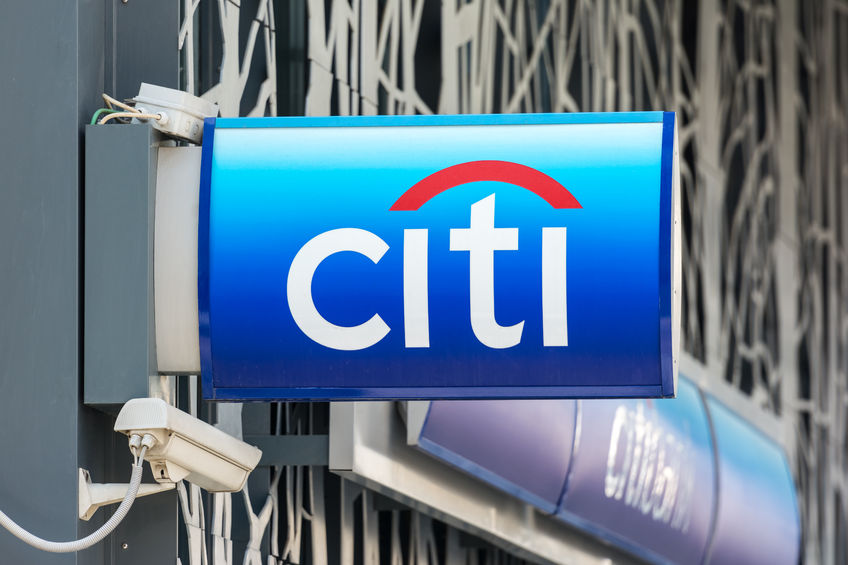 Citi’s release of Bridge, a virtual loan broker offering merchants a three step process to apply for capital through over a dozen banks, has branched out across seven states and is continuing to grow four months in— according to recent LinkedIn posts from Citi employees.
Citi’s release of Bridge, a virtual loan broker offering merchants a three step process to apply for capital through over a dozen banks, has branched out across seven states and is continuing to grow four months in— according to recent LinkedIn posts from Citi employees.
“I am excited to announce I have been working on a new and innovative platform along with the Citi team for the past few months!” wrote Caitlyn Boyle, Assistant Vice President and member of the team who designed Bridge. “I am extremely proud to be part of such an amazing team, and to assist in building out a great platform to connect small and medium sized businesses with local, regional, and community banks.”
“If you are looking for a loan, do not hesitate to visit our platform!” Boyle wrote.
Richard Banziger, Head of Citi’s U.S. Commercial Bank, commented during the launch of the program about Bridge’s potential to not only improve the application process for merchants, but how the program gives access to capital that will be given to minority business owners who may have never been able to get access to that capital in the past.
“Citi believes in the power of local, small businesses and continues to find ways to support businesses that are the foundation of communities across the U.S. Citi funded loans totaling more than $5 billion as part of the Small Business Administration’s Paycheck Protection Program during 2020 and 2021.”
“As both a lender and a community stakeholder, we have a deep understanding of the problems businesses face when trying to navigate the borrowing process” said Banziger. “We are committed to finding digital solutions that can make the process easier, more seamless and more equitable.”
According to Citi, Bridge’s goals are broken down into five points. They hope to create liquidity and access to capital, modernize and automate prospecting, add digitization, transparency, and standardization to the loan process, continue to digitize small and medium sized business lending, and democratize the loan process for lenders and brokers.
“Citi prides itself on encouraging a spirit of entrepreneurship among its employees to solve financial access issues and improve digital offerings for our clients and community partners,” said Vanessa Colella, Citi’s Chief Innovation Officer.
Loan options range from as little as $100,000 to as high as $10,000,000.
Tech Creators, Artists, and Tomorrow’s Entrepreneurs Flock to Miami for NFT BZL
December 1, 2021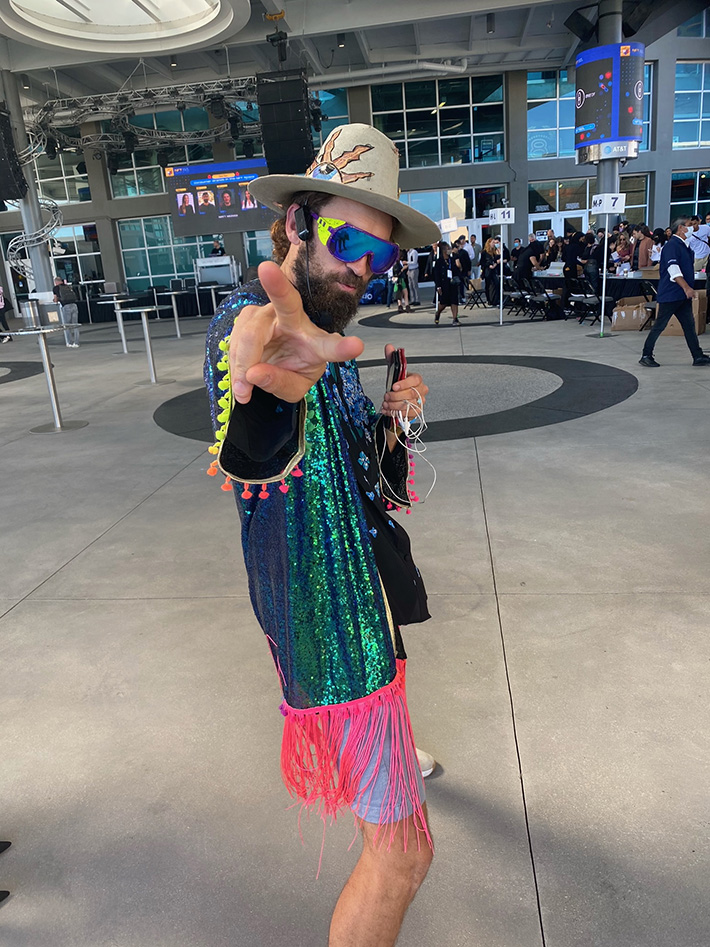 An attendee poses outside of NFT BZL in Miami
An attendee poses outside of NFT BZL in MiamiWhether they’re the future billionaires building the new digital world, or young people with big ideas and crypto-induced riches, money-hungry twenty-somethings showed up in droves to the FTX Arena on Tuesday for what some called the biggest NFT event to ever take place in Miami.
“NFT’s are almost like a hyper version of insurance for authenticity,” said Casey Craig, Global Head of Communications at CoinDesk and speaker during the ‘Culture Converges with Blockchain and Fashion’ panel. Craig spoke about her personal thoughts on the value NFTs provide to everyone involved in NFT buying and selling processes.
“When you think of NFTs and how you authenticate something, and how they’re preserving that rarity, it’s such a game changer,” Craig said. “I think it’s super practical. I think we need this authentication and creativity. I think it will enable not only the creators, but the people that are purchasing these NFTs.”
Other attendees were focused on using the flamboyant nature of the NFT space to sell their projects to those attendees whose goal was to find their next big tokenized investment. An artist who goes by Oona was at the event to promote her NFT project, strutting around in an outfit that covered her in real cash from head to toe.
“I make video art, and for a long time galleries didn’t quite know how to add value to
or create a unified system of value,” said Oona. “I think a lot of artists like myself are coming to the NFT space because it’s finding a way [for artists] to not give up on their dreams yet, you can actually survive and make a living from art, and connect with others through it.”
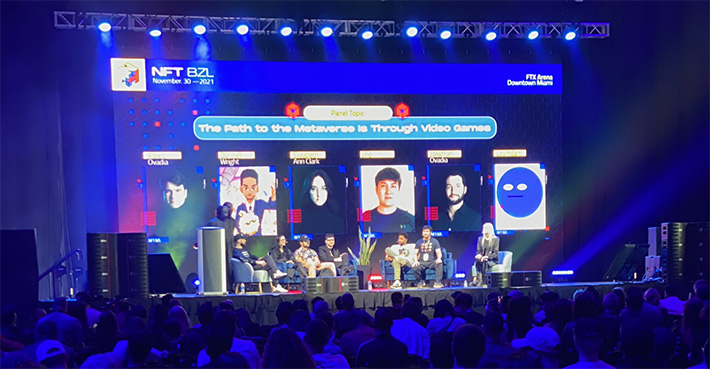 Oona spoke on the art community’s history of attaching themselves to great innovations, and how blockchain technology is just another example of creators utilizing new ways to showcase their work. “NFTs are going to become a normal part of our lives and as per usual, artists have found it first.”
Oona spoke on the art community’s history of attaching themselves to great innovations, and how blockchain technology is just another example of creators utilizing new ways to showcase their work. “NFTs are going to become a normal part of our lives and as per usual, artists have found it first.”
Other individuals in attendance were critical of the media’s take on NFTs, and how the press has built an outside perception of NFTs being of over-the-top art that has little tangible value. Raymond Chen, Community Manager of Nansen, a blockchain data management software tool, spoke on the media’s apparent naive perception of blockchain tech and how real world usage of the technology is more relatable to everyday people than most would think.
“The media’s perception of NFTs is some [nonsense] art that is worth like a hundred thousand dollars, it’s so insane. It’s not just some JPEG on the internet, there is real utility value behind it.”
Chen spoke extensively about the value blockchain tech has for everyday consumers. “If you NFT your house, you can bypass a selling agent, buyer agent, and just cut out the middleman for these things,” Chen said.
“If you NFT your car, you can cut out the middle men when you want to sell your car when it’s used. You’re going to get low balled at a dealership, they’re going to up-charge it, and sell it to someone else for more. If you sell peer-to-peer, you cut out all the middle men, and all this slippage and transaction fees in the middle.”
Those in the fintech-esque field are also taking an interest in the NFT space, like Adam Hanna of Circle Internet Financial; who was there representing a software that allows instant payouts of crypto to dollars, or vice versa, for businesses who wish to accept crypto style payments. Hanna spoke about the next great innovation in crypto, and how whoever can figure that out is in store to cash in at an astronomical level.
“I wish I knew,” said Hanna, when asked what that next big idea is. “The NFT space as a whole is something that is still so young, really, like it’s in the past couple of months that it really took off, it hasn’t even been a full year at this point. So it’s just seeing how it’s constantly evolving, what those next projects are, and how different companies are using their own platform, or other platforms, to really promote NFTs in a different way, that’s where it’s at.”
Notable attendees that deBanked bumped into included Miami Mayor Francis Suarez, child actor turned crypto-tycoon Brock Pierce, rapper Kosha Dillz, and UFC fighter Ali AlQaisi. Members of the Miami Dolphins and Los Angeles Sparks were also in attendance, signing NFT-inspired autographs.
Whether you buy into the hype or think it’s equally as ridiculous, the NFT community will continue to be the loudest, most animated, and exuberant group in the world of modern finance.
The Broker: A Sister Duo Gets Borrower-Centric
November 29, 2021
When the company she worked at was halted by pandemic woes, Porsha Brooks, then an MCA salesperson, was asked by her sister Mercedes how they could get together and pick up where her other company left off. “My sister approached me at that time saying, ‘well what is it you’re doing, I want some action in that’, then I said, ‘that action is kind’ve drying up— but we can do our own thing, we can start our own business.'”
“So, that’s what we did.”
While offering a suite of loan options to their clients, Porsha spoke with deBanked about how her experience in sales, combined with her small business finance knowledge, has powered the creation of a borrower-centric lending product through their company, Brooks Partners Finance.
“As far as MCAs go, I’m not pro or against it, but at the same time, I know what they are,” said Brooks. “The industry for the most part, every MCA [funder], every broker, is pushing MCAs. Everyone is pushing MCAs. But I see that it really does do a detriment to businesses and business owners.”
Although Brooks Partners still writes MCA deals, that’s only if that is the best option for the client at that time. Brooks claims her company’s business model isn’t to push businesses into whatever type of loan makes sense for her company, but rather the opposite, using different types of tools to figure out exactly what loan is best for the borrower.
“If I have every option for that individual, I don’t have to push them into an MCA,” Brooks continued. “I can still get paid, and still do right by that business owner.”
When speaking about her past work, Brooks spoke about how coming up in an all-male environment was actually a motivating experience.
“They quickly judged, saying ‘you know, she’s a woman, and she’s probably not going to last here for too long, because they normally don’t’ and it turns out I did,” said Brooks. “Three months in, I rose to be one of the top salespeople at the firm. Within that time, I got the attention of both partners at the firm, and I would say about a year in, I was promoted to head their new banking department.”
But when the pandemic slowed the business down, it led to the genesis of Brooks Partners Finance. “I already had certain contacts, I had my foot in the door, and I had a taste for bank loans,” said Brooks.
“I’d say the biggest moneymakers for us are SBA and conventional [loans],” said Brooks. “We have a range of banks that we work with and we are able to give to individuals, not just existing businesses, but startup businesses too. We’ve learned the SBA world like the back of our hand. We’ve been studying this for several months, we basically have to know everything about how to get somebody approved for an SBA.”
With access to these types of loans being notoriously difficult for small businesses to qualify for, Brooks spoke about how teamwork between a broker and a merchant can lead to a plan for approval.
“We’re different [from] most brokers in the industry; we’re very, very hands on here. We stay on from the onset until the funding process. Now what we’re doing is we’re holding our clients’ hand. We’re telling them how they can get qualified, taking them through that process, we’re working with the lender, and not letting the lender cut us out.”
“We make sure that we stay in our lenders’ faces for our clients’ benefit,” Brooks continued. “Making sure we are always a part of that process and making sure things go smoothly, so we do get a lot of SBAs and conventional loans done.”
“I’m not just the ordinary middleman, I am supposed to help [my] client and guide them to their best loan option for their business,” Brooks continued. “If I don’t know where I’m sending them or don’t know if they’re going to be qualified, I am doing them a crazy disservice to my client. That’s where we differ.”
AMEX’s Journey from Courier to Creditor
November 24, 2021 Have you swiped your American Express card lately?
Have you swiped your American Express card lately?
If so, you belong to one of the most ambitious company pivots ever known. The credit card company known for its prestigious clientele was once a shipping company and up until the early 1900’s, it exclusively shipped stuff at an expedited pace across America.
The origins of the namesake comes from the company’s previous model, an express courier service in the mid 1800s. During that time, “express” services were the next up-and-coming industry. These services allowed quick and precise shipping of small, valuable items around the United States, and were frequent among people who were concerned with the fragility of their items. It was also a second, faster option to the US Postal Service.
By 1850, the top express services realized that their competition was doing more harm than good for one another. That’s when three New York-based express companies owned by Henry Wells, William Fargo, and John Butterfield combined their companies into one, dubbing the new service American Express.
During the formation of American Express, the California gold rush was at its peak. Promises of new cities that were an escape from the smog dens of the east coast brought millions of Americans out west. Wells and Fargo, the first President and Vice President of American Express, respectively, moved out to San Francisco in an attempt to extend American Express to the west coast during this time.
Wells and Fargo were discouraged by their colleagues at American Express to branch out west, and were forced to simultaneously run American Express in the East, and their new company in the west. This western venture became known as Wells Fargo.
Throughout the rest of the 1800s, American Express continued their ventures in express shipping, expanding operations into railways and expanding their routes around the east coast. The Civil War was a huge growth spurt for the company as the demand for express shipping skyrocketed.
After both Wells and Fargo made their way through the ranks at American Express, both serving as President prior to their departure, it was James Fargo, the son of William, who some say is the individual who introduced the idea of providing financial services for customers in 1891. James was the one to introduce American Express’ money order, a cheaper and more modern version of a system already in place by the postal service at that time. American Express became the provider of the go-to money order for immigrants who wished to send money to their families in various parts of the world. After the huge success of the money orders, this led to the company releasing their trademark product, the traveler’s check, at the turn of the century.
Their full blown transition to financial services occurred in 1918, when the US government nationalized all express shipping companies as part of the World War I fighting effort. This resulted in the company being left only to function off of its two side ventures, money orders and travelers checks.
These stayed relatively stagnant for the next fifty-or-so years until American Express started to become what we know them as in today’s market. In 1958, the company issued its first credit card. Half a million people signed up for the card in its first 90 days on the market.
The rest is history. The charge card, then the tier’d cards, followed by their prestigious centurion or “black” card, the options expanded into different tiers of luxury through credit. This prestige that justifies the consumer fee, combined with the high fees they charge merchants to process the payments, is why the company is so successful. As American Express clients tend to make and spend more money, merchants are inclined to take American Express cards to attract their market, and just consider the higher fees as just a cost of doing business.
Not only is American Express an impeccable example of brand construction and marketing, but a great learning opportunity for any business who is forced to change their business model due to extenuating circumstances. Their story gives the notion that no matter the size of the company, the opportunities are endless with the right balance of dedication, innovation, and calculated risk taking.
Private Lender Expo Shows The State of Real Estate Investing Industry
November 19, 2021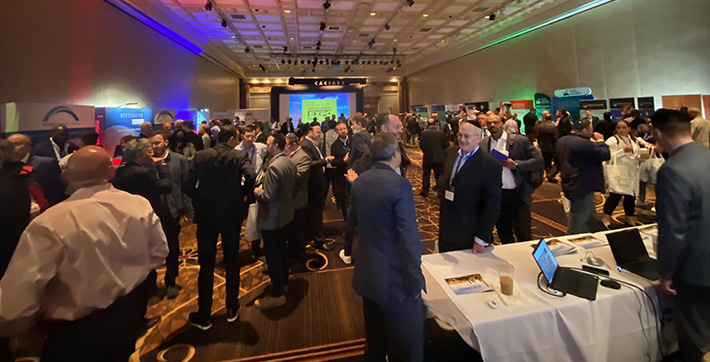 “We’re here because we’re looking to see if we can branch into real estate lending,” said Porsche Brooks, CEO of Brooks Partners Finance, a company that provides a suite of funding services that include both MCAs and SBA loans.
“We’re here because we’re looking to see if we can branch into real estate lending,” said Porsche Brooks, CEO of Brooks Partners Finance, a company that provides a suite of funding services that include both MCAs and SBA loans.
Brooks was one of many that attended the Private Lender Expo in Atlantic City on Thursday, where financiers, developers and more talked heavily about apartment complex and suburb-centric commercial real estate development.
“There are opportunities here,” said Brooks. “We’re really looking to expand.”
While there was evidence of fintech making its way through the space, companies providing document-digitizing software were hesitant to label themselves as fintech companies.
A representative from CoStar, a technology-centric real estate information company, called themselves “fintechy” but made it clear that they are only looking to function within the current space, not revolutionize it.
Those who hosted booths at the event showed little interest in expanding business operations into small business financing as a way to grow their lending options. As real estate investments continue to pay hefty dividends, lenders who focus on that area aren’t looking to dilute their effort into other ventures.
“Small business lending can be such a headache,” said one real estate investment company representative when asked if they would ever venture outside of their investment property exclusivity into funding merchants. “The amount of money in real estate right now is evident all around us. There’s always a lot of people at stuff like this that will give you a million dollars, but now this stuff is becoming all real estate.”































